All Disquiet in the Twilight Zone
When the classic TV show dealt with nuclear war, it deployed its full arsenal of complex ethical issues, plot twists, and inimitable flair
Picture, if you will, this:
The Twilight Zone was a pathbreaker in the history of television shows. Innovative, very well written and acted, from science fiction to horror to alternate history — it had it all. Creator, narrator, presenter, and scriptwriter Rod Serling was a gifted storyteller, already celebrated in the early 50s.
Serling was not afraid to address contentious issues, but things went sour when he decided to take a stand on the torture and murder of African-American teenager Emmett Till in 1955, after the two white killers were deemed not guilty by an all-white jury in Mississippi. He intended to write a TV script denouncing racism, only to be thwarted by corporate censorship. But this turned out to be a blessing.
Because The Twilight Zone came about as his answer to censorship.
TV as an art form
Serling figured out that the best way to turn things around was to create a science-fiction TV show — something that was not taken seriously at all at the time. But exactly for this reason, he would be more free to explore existential questions wrapped in ethical conundrums about social and political issues.
As a result, hefty doses of food for thought were served between 1959 and 1964. Serling had an eye for the unsettling lurking just below the thin veneer of the normal. Clever and disconcerting twists became television classics, showing that sci-fi TV could be as prestigious as more established genres. The show went on to win three Emmys, and Serling succeeded in turning TV into an art form.
He was not alone, of course. Through the years, many talented writers, composers (like Bernard Herrmann, of many Hitchcock films) and actors, including new faces like Robert Redford, Dennis Hopper, and William Shatner, contributed. But the show was Serling’s child.
War is good for absolutely nothing
Besides his strong support for civil rights, Serling was also an anti-war activist. A veteran of World War 2, he saw the devastating effects of war first-hand.
In interviews, Serling expressed his concern about the Cold War, and he often called for disarmament and peaceful solutions to international conflicts. He was also critical of the military-industrial complex, which he saw as a driving force behind the arms race and the political/military escalation between the United States and the Soviet Union.
It’s no surprise, then, that nuclear war is one of the show’s themes.
There are four episodes that deal explicitly with nuclear war. If you haven’t watched them yet, proceed at your own peril.
You have been warned.
Time Enough at Last (Season 1, Episode 8, 1959)
“Witness Mr. Henry Bemis, a charter member in the fraternity of dreamers. A bookish little man whose passion is the printed page but who is conspired against by a bank president and a wife and a world full of tongue-cluckers and the unrelenting hands of a clock. But in just a moment Mr. Bemis will enter a world without bank presidents or wives or clocks or anything else. He'll have a world all to himself without anyone.”
This fan favourite tells the story of Henry Bemis (Burgess Meredith), a bookworm and bank teller, who is so addicted to reading that his life becomes a wreck. Bemis is constantly berated by his wife and boss because he can’t stop reading — not even food labels.
His wife is so desperate that she goes full sadistic, asking Bemis if he would like to read one of his poetry books, only to show him all the pages disfigured by heavy markings. To his utmost shock, she tears out all the pages.
One day he manages to sneak off to the bank vault to read alone during his lunch break. A few moments later Bemis hears a loud explosion and emerges from the vault to find that a nuclear war has destroyed the world. He is the only survivor and wanders the city in shock, searching for any signs of life.
Desperate after searching for his wife in vain, Bemis considers killing himself, but eventually he discovers a public library that has miraculously survived the explosion. It’s a dream come true. However, his joy is short-lived, as he lets his thick glasses fall to the ground and they get shattered.
The episode ends with Bemis, alone and unable to read, lamenting his cruel fate. “That’s not fair”, he says pitifully. The twist ending is one of the most memorable in television history.
“The best-laid plans of mice and men — and Henry Bemis, the small man in the glasses who wanted nothing but time. Henry Bemis, now just a part of a smashed landscape, just a piece of the rubble, just a fragment of what man has deeded to himself. Mr. Henry Bemis in the Twilight Zone.”
The Shelter (Season 3, Episode 3, 1961)
“What you are about to watch is a nightmare. It is not meant to be prophetic, it need not happen, it's the fervent and urgent prayer of all men of good will that it never shall happen. But in this place, in this moment, it does happen. This is the Twilight Zone.”
"The Shelter" is considered one of the most powerful and controversial episodes of the series, and in fact, of all TV shows. The story revolves around Dr William Stockton, a respected physician who lives in a suburban community (suburbs upset by what lies beneath was one of Serling’s favourite subjects).
One evening, he is having a birthday party at home with his family and friends. They joke about what they see as Stockton’s overcautious behaviour, since he had been building a fallout shelter in case a nuclear war happens — something that was pretty much in the air in the early 60s.
Suddenly, they hear a news report saying that a UFO has been sighted and is headed towards their town — it may be a nuclear attack, and people will need to take refuge in their bomb shelters. Stockton’s friends and neighbours run to their houses, but since none of them built a shelter, they go back to the physician’s.
Problem is, the shelter is only equipped to hold three people, and there are six outside. As tensions rise and panic sets in, Stockton's friends demand to be let into the shelter.
Stockton initially refuses to let anyone else into the shelter, stating that he has built it for his family and that they will need all the supplies to survive. However, his friends become increasingly desperate, and eventually break down the door to the shelter. Suddenly a public broadcast announces that the UFO was just a satellite, and there was no risk of an all-out war. But in the end Stockton sadly comes to the realization that their lives had been destroyed anyway.
"The Shelter" is a disturbing portrait of the Cold War-era mentality of the time, and the fear and paranoia that were prevalent in American society. It raises questions about the nature of humanity, and the lengths that people will go to in order to survive.
“No moral, no message, no prophetic tract, just a simple statement of fact: for civilization to survive, the human race has to remain civilized. Tonight's very small exercise in logic from the Twilight Zone.”
Third from the Sun (Season 1, Episode 14, 1960)
“Quitting time at the plant. Time for supper now. Time for families. Time for a cool drink on a porch. Time for the quiet rustle of leaf-laden trees that screen out the moon. And underneath it all, behind the eyes of the men, hanging invisible over the summer night, is a horror without words. For this is the stillness before storm. This is the eve of the end.”
In this episode, adapted by Serling from a story by renowned sci-fi author Richard Matheson, the world is on the brink of nuclear war. William Sturka, a scientist working at a government facility producing H-bombs, has learned that the war will start in 48 hours and that there will be no survivors. Along with his colleague, test pilot Jerry Riden, he plans to steal a spaceship and escape with their families to a planet that they have discovered with a similar civilization.
The episode excels in conveying the tension and dreadfulness involving the characters running against time and fearing that their plan will be uncovered by their suspicious boss, Carling — who seems to know everything and be everywhere.
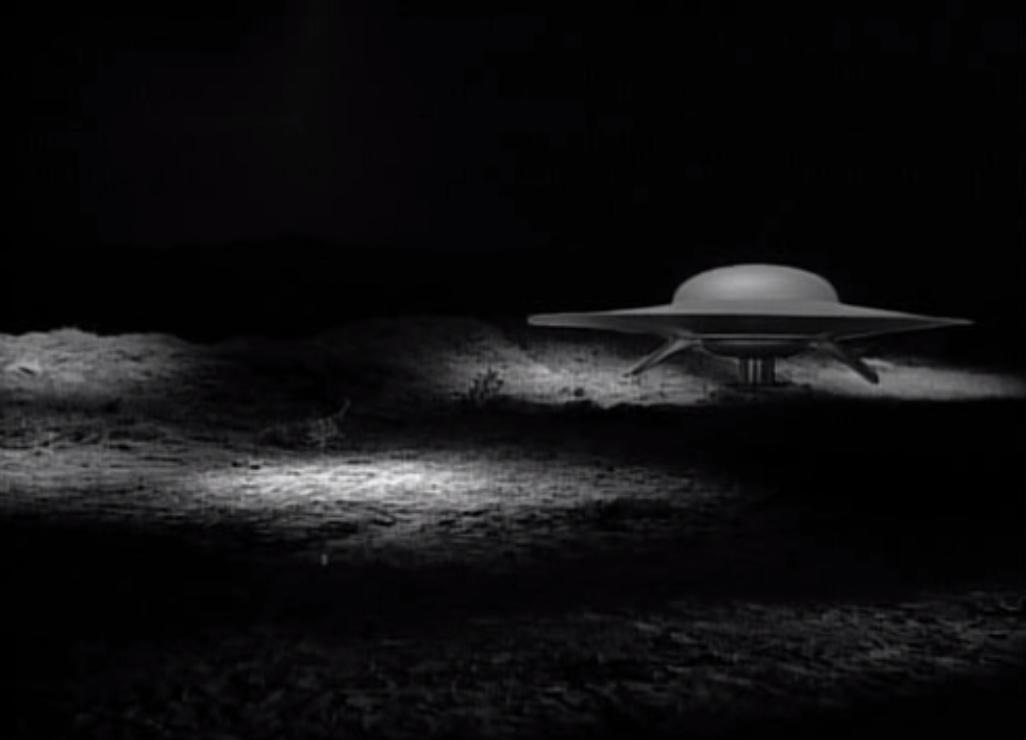
When the five of them — Sturka, his wife and daughter, plus Riden and his wife — reach the base in the nick of time, they have a final confrontation with Carling and manage to overcome him. The security guards are closing in, but they escape and, after a long trip, the destination is within sight. “It's the third planet from the Sun, Bill”, says Jerry. “It’s called Earth”.
They really didn’t know what they were getting into, but at least our planet is still standing — even though disaster is looming again. That final twist is a classic in the show’s history.
“Behind a tiny ship heading into space is a doomed planet on the verge of suicide. Ahead lies a place called Earth, the third planet from the sun. And for William Sturka and the men and women with him, it's the eve of the beginning in the Twilight Zone.”
One More Pallbearer (Season 3, Episode 17, 1962)
“What you have just looked at takes place three hundred feet underground, beneath the basement of a New York City skyscraper. It's owned and lived in by one Paul Radin. Mr. Radin is rich, eccentric and single-minded. How rich we can already perceive; how eccentric and single-minded we shall see in a moment, because all of you have just entered the Twilight Zone.”
This psychological thriller centres around Paul Radin (Joseph Wiseman, who played Dr No that same year). Radin is a wealthy and powerful man who invites three people from his past — a high school teacher, a colonel and a priest — to an underground bunker, claiming that they will be safe from a nuclear war that he believes is imminent.
Radin has strong grudges against each one, and once they are in the bunker, he tells them they can take refuge there, as long as they admit their supposed wrongdoings and beg for his forgiveness. He had installed a sophisticated audio-visual apparatus to simulate an attack. But even after listening to realistic public service announcements, they refuse to apologize, and call out his hoax. Radin becomes increasingly unstable and delusional.
All three leave, and Radin sees a nuclear explosion in the big screen he had installed in the bunker, together with powerful sound effects. He leaves and, outside, sees a world devastated by nuclear war.
But in fact it was all a figment of his imagination. Radin was so devastated by the failure of his plan that his mind went haywire. Or had the whole story happened only inside his head? We’ll never know, and leave him crying, forever defeated.
“Mr. Paul Radin, a dealer in fantasy, who sits in the rubble of his own making and imagines that he's the last man on Earth, doomed to a perdition of unutterable loneliness because a practical joke has turned into a nightmare. Mr. Paul Radin, pallbearer at a funeral that he manufactured himself in the Twilight Zone.”
Legacy
The Twilight Zone inspired generations of writers and directors, including some of the most celebrated, like Guillermo Del Toro, Stephen King, George R. R. Martin, Mel Brooks, Jordan Peele, and M. Night Shyamalan.
Serling died in 1975, and later the show evolved into a franchise, with three TV series (1982, 1985, and 2019) and two films (1983 and 1994). None of them had the same impact as the original.
And now a bit of trivia to wrap this up.
Did Rod Serling ever say “Picture, if you will”?
No he didn’t. In all openings and closings of the 156 episodes, the only time when he comes close is “Witness, if you will”, in The Lonely, episode 7 of the first season.
And since we’re at it, he also never said “Imagine, if you will”.
The bizarre story of the show’s theme music









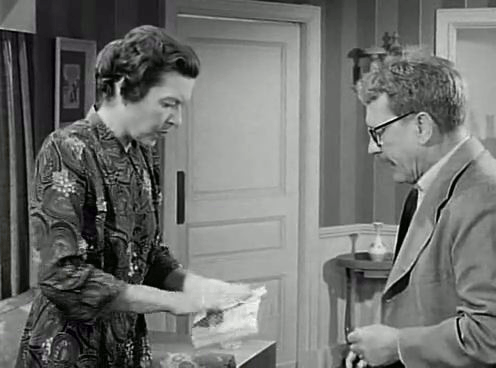
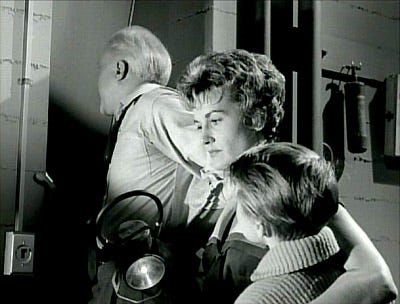


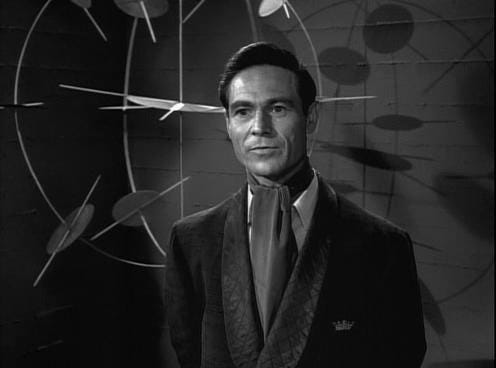
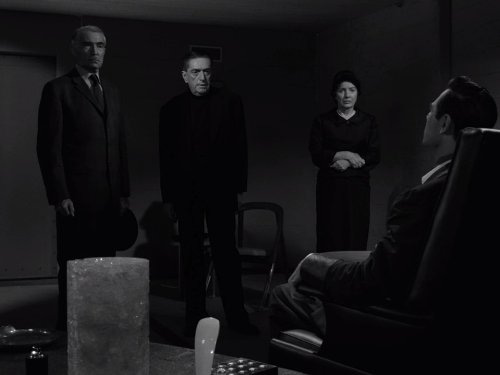
I met my first girl friend at a talk by Serling, so I'll always like the show. :-). It was a good show indeed, girlfriend or not.
You write, "Serling often called for disarmament and peaceful solutions to international conflicts."
This is a well intended but immature understanding of international conflicts, and conflict more generally. The overwhelming majority of the time violence around the world is not caused by misunderstandings which can be resolved through reasoned dialog, but rather by violent men functioning as predators.
Peace activists have confused how we should behave in our dealings with civilized sane people, and how we need to respond to psychopaths, predators, and evil. You can't negotiate with the Devil, you either end him, or he ends you.
There is a solution. Remove violent men from this world. This may require removing all men. We can have world peace, real peace, historic unprecedented peace, peace beyond our imaginations.
We just need to be willing to pay for it.
https://www.tannytalk.com/s/peace
What I've learned over the past few years is that getting rid of nuclear weapons won't solve the problem, as violent men would then just turn their attention to other means of horror, and we'd be right back where we are now in no time.